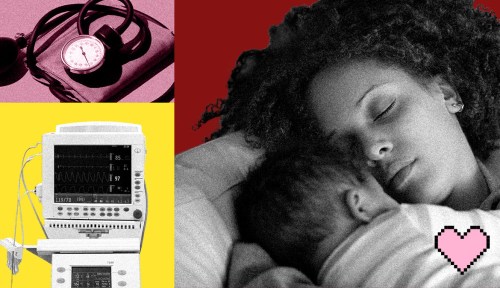When you’re pregnant, a full medical team is looking out for you and your baby. But after the baby arrives, most new parents go home with their newborn, some pamphlets and postpartum pads, and an ob/gyn appointment card for a few weeks. Support for new parents during the postpartum period—aka the “fourth trimester”—is far from robust. in the United States, postpartum medical care is “too limited to meet the health needs” of women and other people who give birth, according to a critical review from The Journal of Perinatal Education.
Experts in This Article
And those needs are numerous indeed. “Despite the overwhelming plethora of responsibilities new parents face, birthing people still possess a whole host of medical, emotional, and psychological needs during the postpartum period,” says doula Danielle Jernigan, MS, who specializes in perinatal mental health and trauma-informed care. That’s where postpartum doulas come in. Much as a birth doula provides support and guidance through the process of childbirth, postpartum doulas help support the birthing parent during those challenging first days, weeks, and even months with a newborn.
Having a postpartum doula can help new mothers adjust to the roller coaster of physical and emotional changes they’re experiencing. “[My doula] was so pivotal in that first stretch when I first got home,” says dancer and Lion Babe musician Jillian Hervey, who spoke about her postpartum experience alongside doula Latham Thomas at the Mama Glow Doula Expo. “My hormones were dropping, which is biologically normal but emotionally very difficult. There was all of this information to digest, but she was able to explain it so well and help me understand what was going on. At this point, I can’t imagine what I would have done without that.” That experience motivated her to spread the word about postpartum doula care. “You should not have to endure this ‘fourth trimester’ by yourself,” she says.
What does a postpartum doula do?
“For both pregnancy and postpartum, doulas support the mother in three ways: we provide education and awareness, we advocate for them, and we support them emotionally,” says Jernigan. “Doula care has shown to increase positive outcomes for the mother and child.”
After a baby is born, postpartum doulas focus on “mothering” the new parent by taking on an array of tasks and responsibilities. Those might include practical matters such as meal prep and breastfeeding guidance, but it often involves helping new parents understand the stages of their postpartum recovery. “After birth, we educate them on how their body may change and encourage them to keep their mental and physical health a top priority,” says Jernigan. “We also encourage them to keep open lines of communication open with their medical team. If they suspect something is off, we encourage them to call their physician.”
Postpartum doulas aren’t a replacement for your doctor. Doulas do not provide medical care, administer medicine, or facilitate labor and delivery, according to the National Black Doulas Association. Those tasks and responsibilities, according to the NBDA, are relegated to medical professionals known as midwives or obstetrician-gynecologists (aka OB/GYNs). But as for helping you understand your lochia or assisting with tasks so your Cesarean incision can heal, a postpartum doula can do that and more.
“You should not have to endure this ‘fourth trimester’ by yourself.” —Jillian Hervey
What needs does a postpartum person have?
“Moms and parents who just had a baby need support,” says Rachel Taylor, RN, SBCPE, CE, a registered postpartum nurse and doula with Mama Did It. “They need dinners brought to them, groceries delivered, people to hold her baby while they shower and dress, someone to offer to run her errands, and also someone to give her a break in between feeding her baby.”
Aside from having to take care of a newborn, parents who just gave birth are also recovering from a major medical procedure. The needs of a postpartum person vary based on what they experienced during labor and delivery, says doula and lactation consultant Beth Ann Martin, MPH, CLC, CD/PCD (DONA). For instance, if you had stitches after birth, you may need ice packs or to limit your range of motion. Other people may need to take pain medication or wear disposable underwear while their body sheds afterbirth fluids. Doulas may also be the first people to recognize signs of postpartum depression or anxiety, which can help new parents get the professional support they need.
“Postpartum doula care is here to say that it’s okay to need help and ask for it.” —Kelsey Nevins, certified doula
Adapting to changes and needs is a huge part of postpartum care, says Taylor. The truth is that sometimes things just don’t go as planned. Maybe the baby doesn’t end up breastfeeding, the infant could have unexpected disabilities upon arrival, the parent or mom could experience postpartum depression, you could have injuries like tearing or tailbone pain after birth, or any number of life’s variables could throw a wrench (or rattle) into an otherwise sparkling and neat birth plan, Martin adds. The secondary point here, though, is that it’s not the end of the world when things change. Doulas can be there to help a family course correct.
What can a postpartum doula do for a family?
A primary goal of a doula is to meet a pregnant or postpartum person where they’re at. Even if chores or dishes don’t sound like what a doula might typically do, if it’s what a person needs at the time—then that’s often the care that a postpartum doula would be happy to provide, says Jernigan. “A postpartum doula is someone who helps a mother in her recovery after childbirth. She may educate, take care of her, cook a meal, care for her baby, do light chores, or run errands for the mom,” says Taylor. “A good postpartum doula can make the transition from childbirth to motherhood smoother. She can educate the mother in her healing recovery as well as help care for her and her baby. She also provides knowledge on how to breastfeed and care for her newborn.”
Tending to the parent’s needs doesn’t just help the parent; it has benefits for babies, too. “Many families are unaware that the baby co-regulates with the parents. If the parents are calm, the baby will be calm,” says Kelsey Nevins, a certified doula of The Movement Doula.
Though doulas don’t perform medicine without relevant credentials, they can be a sounding board for whether or not their clients should get in touch with their care team as well.
Why is it important to spread awareness about postpartum doulas?
Ironically, because doulas fulfill such diverse needs, some people mistakenly believe that a postpartum doula isn’t what they might need. But if, say, you need help with chores or meals, not necessarily breastfeeding, a doula can still step in, says Jernigan. Postpartum doulas can offer their skills that range from specific knowledge they’ve trained for and domestic support like unloading your dishwasher or picking up other slack around the house that you may fall behind on, she notes. “Oftentimes, people could think of needing help with chores or meals as a failure of good parenting, but postpartum doula care is here to say that it’s okay to need help and ask for it,” Nevins adds.
Additionally, as Thomas and Hervey pointed out at the Mama Glow Doula Expo, knowing that you could hire someone to support you in your postpartum period is important for making plans to do so. The same goes for knowing the specifics of what postpartum doulas offer. If sleep is of the utmost concern for the new parent, some doulas offer night shifts where they take on all or part of the infant care so that the birthing parent (or both parents) can get their full night’s sleep.
This need for awareness is also essential for financial planning to pay for a postpartum doula. Although postpartum doula services can be expensive, there are ways to make it more affordable. Some insurance plans do cover part of or the entire cost of a postpartum doula, Martin says. She advises families to talk with doulas about sliding scale pricing and to look into using eligible FSA or HSA funds for this care. And in some places, postpartum care is moving from a “nice to have” into the “necessary care” column. For example, the New York State Doula Pilot Program, which began in 2018, covers doula care for Medicaid recipients. The program covers four visits with the doula before delivery, support during labor and delivery, and up to four visits after delivery.
These experts highlight the fact that people often consider the needs of birthing parents and the needs of infants as very separate categories; when in reality they are deeply intertwined. The more that parents’ needs are met, the better they can feel, and the better they can care for their babies. Postpartum care is about making space for the mother or postpartum parent’s needs—because they are worth care just as much as their new arrival is.
Sign Up for Our Daily Newsletter
Get all the latest in wellness, trends, food, fitness, beauty, and more delivered right to your inbox.
Got it, you've been added to our email list.











